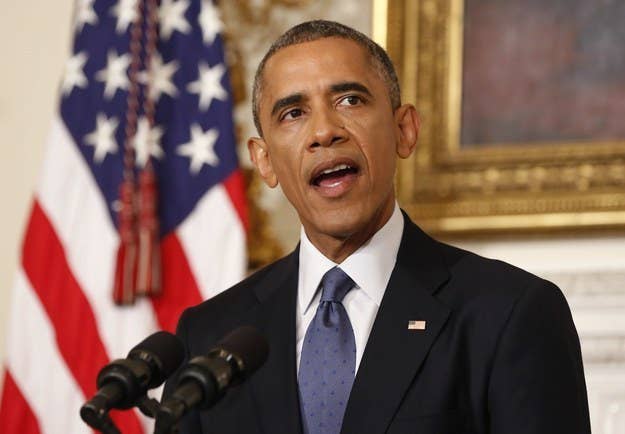
For a president who has been extremely unwilling to see the U.S. intervene again in the Middle East, a major reason for pulling the trigger on today's military strikes on Islamist extremists in northern Iraq seems to be this: It's the path of least resistance.
For more than two years, Syrian rebels have been begging the White House for major military support — against the regime of Syrian President Bashar al-Assad, and against the extremists who have eaten away at their rebellion from within, the Islamic State of Iraq and Syria (ISIS), the very group the U.S. is now bombing in Iraq. The Obama administration has resisted, arguing that U.S. involvement might only exacerbate the bloodshed — while also drawing America into the kind of conflict he promised, during his 2008 election campaign, to avoid.
Moderate Syrian rebels may be asking themselves, why northern Iraq? But they likely know the answer already.
The Obama administration can strike at ISIS outside the Kurdish city of Irbil while avoiding the major issues that would bedevil similar military action in Syria, or even elsewhere in Iraq.
For one, his international rivals aren't set against military action in Iraq — unlike in Syria, where both Iran and Russia steadfastly back the regime.
In Syria, the open secret is that the Obama administration doesn't want to see the regime lose the war, because it worries that would create even more of a power vacuum and empower the Islamist fighters who now dominate the rebellion. In this scenario, the path of least resistance has meant allowing the conflict to continue without a resolution, with the U.S. and its allies giving rebels just enough arms and ammunition to survive.
While the U.S. has been arming some moderate rebels through a covert CIA program — and may do so overtly next year via a $500 million Pentagon program Obama announced in June — such efforts are far from enough to change the tide of the war. They seem designed instead to keep the moderates alive and to counter the rising extremist tide among the rebel ranks.
Air strikes against ISIS in Syria would be of questionable utility without strong moderate allies inside the country. And they could be viewed as a move to aid Assad.
In Iraq, meanwhile, Obama has been reluctant to provide direct military assistance to the government of Nouri al-Maliki, the Shiite prime minister, whose authoritarian and sectarian-tinged policies helped to spark the Sunni insurgency that let ISIS surge in Iraq in the first place. Maliki's forces have been reinforced by Iran-controlled Shiite militias, and they have also been condemned for deploying barrel bombs over civilian areas, making it difficult for the U.S. to support them. As ISIS and allied Sunni militants marched toward Baghdad in June, the U.S. responded by sending military advisors and pushing for Maliki to step down.
The Kurds, however, make for more palatable allies. They boast a militia — called the peshmerga — that are secular-minded and also well-organized. The Kurdish region is also home to major U.S. oil companies and has long had close ties with Washington. Many of the Iraqis who have fled other parts of the country amid recent ISIS advances have taken shelter in Irbil, which had been relatively stable and secure since the U.S. overthrew the regime of Saddam Hussein.
With ISIS drawing ever closer to Irbil this week — following a surprise rout of the peshmerga in some outlying towns last weekend — calls for U.S. action became harder than ever to ignore. With ethnic and religious minorities like Christians and the Yazidis fleeing, Secretary of State John Kerry acknowledged in a statement on Thursday that the ISIS advances "bear all the warning signs and hallmarks of genocide."
U.S. warplanes can work to keep ISIS from advancing into Irbil while avoiding the type of intensive campaign that would be needed to drive them out of their new strongholds, such as the city of Mosul, the heart of the so-called caliphate that ISIS declared in June. In a sense, they are preserving the status quo.
While trying to uproot ISIS in a major city like Mosul would be extremely difficult — and also kill a lot of civilians — strikes like today's involve hitting the advancing militants in more open terrain.
To stick with Obama's preference of using sports analogies to explain his foreign policy, the U.S. looks to be playing defense against ISIS, not offense. A broader military effort to defeat ISIS in Iraq and Syria may not be in the cards right now.
Yet this containment policy is arguably what allowed ISIS to gain strength in the first place, initially inside Syria and later in Iraq. Syrian rebels have warned from the outset that allowing the conflict to continue would let extremists take root — an argument that Assad and his backers could make too. As the top Syrian rebel commander at the time warned this reporter in the summer of 2012, when the civil war was escalating: "Leaving Syria like this is very dangerous. It may become another Afghanistan or Iraq."
